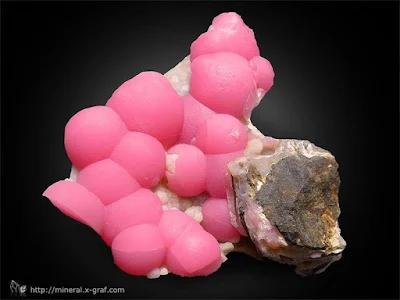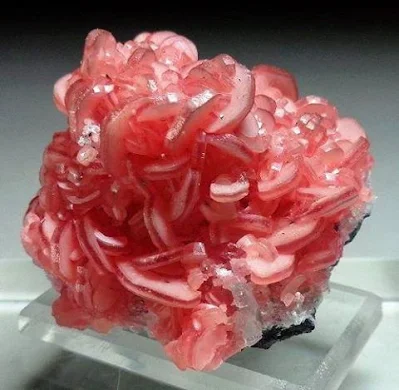Rhodochrosite: Facts With Photos
Rhodochrosite is a very attractive mineral with an absolutely one-of-a-kind, beautiful color.
Rhodochrosite is a manganese carbonate mineral with chemical composition MnCO3. In its (rare) pure form, it is typically a rose-red color, but impure specimens can be shades of pink to pale brown. Its name comes from the Greek words "rhodon" meaning rose and "chrosis" meaning color.
 |
| Rosette Rhodochrosite From Huachocolpa Mine, Peru. Copyright © Xdxu |
It was first described in 1813 in reference to a sample from Cavnic, Maramureş, present-day Romania. According to Dimitrescu and Radulescu, 1966 and to Papp, 1997, this mineral was described for the first time in Sacaramb, Romania, not in Cavnic, Romania. The name is derived from the Greek word ῥοδόχρως meaning rose-colored.
 |
| Amazing plate of Stalactites Rhodochrosite from MineSanta Rita, Argentina. credit: Ignacio Adrian Tepman. |
It streaks white, and its Mohs hardness varies between 3.5 and 4. Its specific gravity is between 3.5 and 3.7. It crystallizes in the trigonal system, and cleaves with rhombohedral carbonate cleavage in three directions.
Rhodochrosite occurs as a hydrothermal vein mineral along with other manganese minerals in low temperature ore deposits as in the silver mines of Romania where it was first found. Banded rhodochrosite is mined in Capillitas, Argentina.
 |
| Rhodochrosite with unique crystal Shape and color from Moanda Mine, Gabon. Photo Credit: Yasu Okazaki |
Rhodochrosite forms a complete solid solution series with iron carbonate (siderite). Calcium, (as well as magnesium and zinc, to a limited extent) frequently substitutes for manganese in the structure, leading to lighter shades of red and pink, depending on the degree of substitution. It is for this reason that the most common color encountered is pink.
 |
Stunning Rhodochrosite Stalactite slice- from Capillitas
Mine, Catamarca, Argentina. credit: LGF Foundation, Inc. |
Its main use is as an ore of manganese which is a key component of low-cost stainless steel formulations and certain aluminium alloys.
 | |
| Gemmy red rhodochrosite zoned botryoidal crystals. From N'Chwaning Mine, Northern Cape Province, South Africa credit: Le Comptoir Géologique |
Due to Rhodochrosites being relatively soft, and having perfect cleavage, it is very difficult to cut, and therefore rarely found faceted in jewelry.
 |
| Botryoidal Rhodochrosite with chalcedony From Conselheiro Lafaiete, Minas Gerais, Brazil Photo Copyright © Xdxu |
Rhodochrosite is Argentina's "national gemstone". Colorado officially named rhodochrosite as its state mineral in 2002.
 |
| Rhodochrosite Crystals from China. Photo credit: John Veevaert |
 |
| Rhodochrosite crystals on manganese oxides. Uchucchacua Mine, Peru. Photo: Martin Hingst |
 |
| The trapiche-like rhodochrosite “flower” from Argentina’s Capillitas mine. Credit: Russell E. Behnke |
 |
| Rhodochrosite avec Quartz, Fluorite et sulfures "Centennial pocket" of the Sweet Home mine in Alma, Colorado, USA. Collection & photo: Simone Citon |









